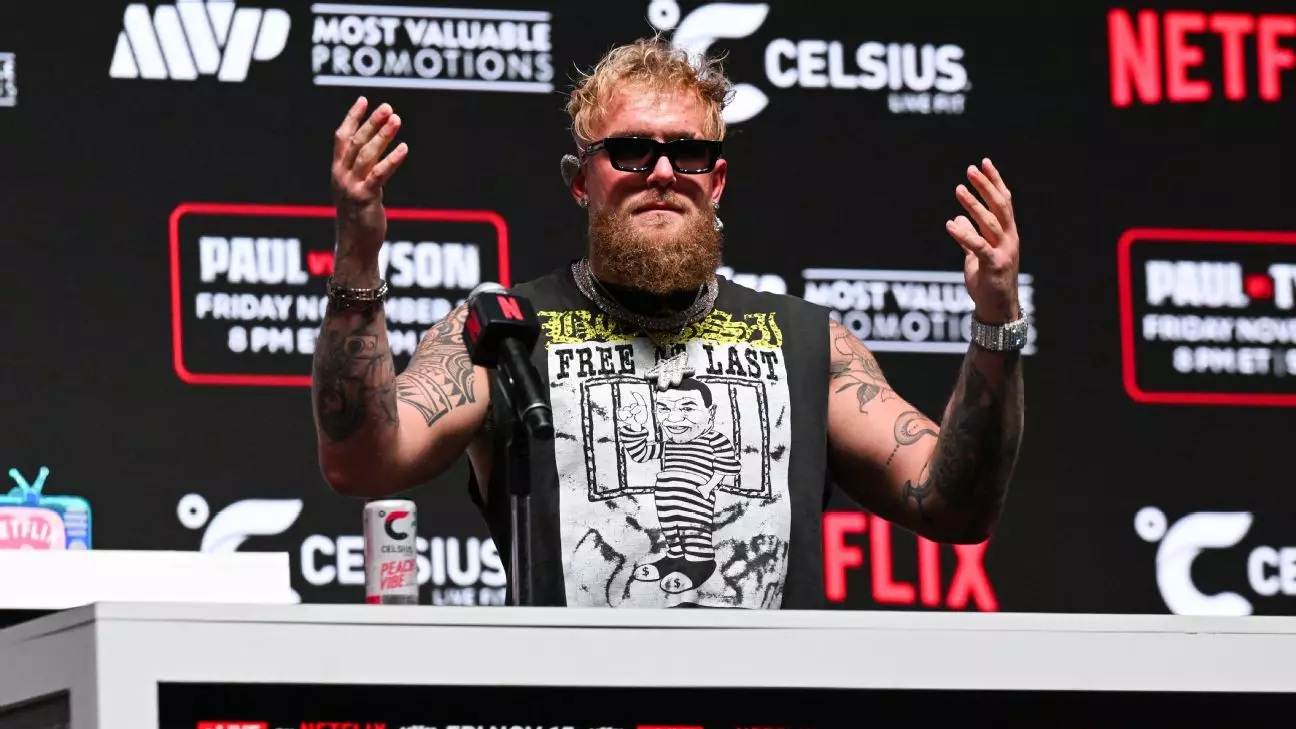The upcoming boxing match between Jake Paul and Mike Tyson has ignited a whirlwind of anticipation and controversy, emblematic of the changing landscape of the sport. Not just a contest of physical prowess, this fight represents a broader narrative surrounding celebrity culture, the evolution of boxing, and the intense reactions that both fighters elicit from the public. As Paul prepares to enter the ring against a titan of the sport, he fully understands his role as the antagonist in this drama, countering the warm reception that Tyson typically receives.
Jake Paul has had a tumultuous journey in the boxing world, transforming from a YouTube sensation into a polarizing combatant. At just 27 years old, he boasts a respectable professional record of 10 wins and only one loss, with seven of those wins coming by way of knockout. However, legitimacy in boxing is about more than numbers; it is also about the caliber of opponents faced. Critics often accuse him of choosing easy targets; they cite his decision to fight influencers and former MMA fighters rather than seasoned professional boxers. This upcoming fight with Tyson, a 58-year-old former world heavyweight champion, does not do much to alleviate those critiques. The concern is that Paul’s choice of opponent is less about competitive spirit and more about securing a paycheck and publicity.
Despite the skepticism surrounding his choice of opponents, Paul is nothing if not savvy. His ability to draw crowds and generate interest is undeniable, even if it comes through controversy. The crowd at the recent press conference further indicated the dynamics at play: Paul was clearly the less popular figure, overshadowed by Tyson’s legacy. The stark contrast between the two fighters’ personas—one a revered champion and the other a self-proclaimed villain—sets the stage for a narrative that is as compelling as the match itself.
Jake Paul appears to have embraced this villainous role, purposefully stoking the flames of contention. During the press conference, he acknowledged the negative perception that many have of him, revealing a striking self-awareness. “I tell people I’m purposely pissing them off,” he stated. This manipulative engagement with the fanbase showcases not just an understanding of his position but also an entrepreneurial spirit, allowing him to capitalize on public sentiment.
Paul’s strategy appears to be one of acceptance rather than rebellion against criticism. By framing himself as the antagonist, he caters to an audience that thrives on conflict, thus amplifying the stakes of the encounter. His bold declarations, including a promise that the fight would not go the distance, echoes a desire not only for victory but for a performance that will be remembered.
This bout also transcends the realm of sports, reflecting societal attitudes toward celebrity, masculinity, and the idea of the ‘American Dream.’ Paul, with his roots in social media fame, stands for a new generation of celebrities who utilize their platforms for personal branding and marketability. Tyson, on the other hand, embodies the traditional ethos of boxing, where skill, grit, and historical significance matter. This cultural clash is emblematic of a generation that craves authenticity in a world saturated with curated images.
As Paul looks to dethrone the heavyweight icon, viewers are not just tuning in for the fight—they are engaging in a social phenomenon. This matchup is a mirror reflecting contemporary society’s love for spectacle, drama, and the highs and lows of personalities embroiled in public life. For many, rooting for Tyson symbolizes a return to authenticity, while supporting Paul may represent an embrace of modernity in all its controversial glory.
The fight between Jake Paul and Mike Tyson promises to be more than just a sporting event; it is a cultural touchstone that encapsulates the shifting dynamics in boxing and entertainment. As both fighters prepare to clash, the anticipation grows, fueled by a rich tapestry of narratives—legacy versus novelty, hero versus villain. How this bout unfolds will likely not only affect their careers but also provide a clearer picture of the future path boxing will take in navigating fame, combat, and public perception. Whatever the outcome, it is clear the event will reverberate far beyond the confines of the ring.


Leave a Reply